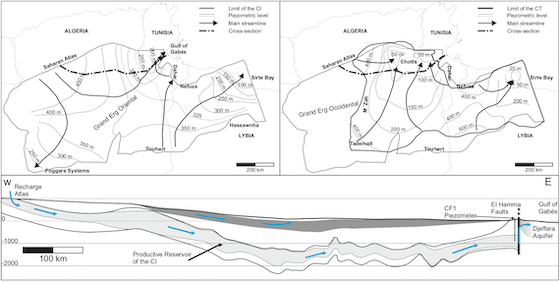Goncalves, J., Deschamps, P., Hamelin, B., Vallet-Coulomb, C., Petersen, J., et al. (2020) Revisiting recharge and sustainability of the North-Western Sahara aquifers. Regional Environmental Change, Springer Verlag, In press, 20 (47), doi.org/10.1007/s10113-020-01627-4
Abstract
In recent years, geochemical and geophysical studies have challenged the commonly held view that the use of fossil Sahara aquifers is completely unsustainable because they have not been recharged since the last wet period of the Holocene. Here, we use gravity data and groundwater flow modeling to provide further evidence of modern recharge of the North-Western Sahara Aquifer System (NWSAS, Algeria, Tunisia, and Libya). The rainfall-recharge relationship previously established using data from the Gravity Recovery and Climate Experiment (GRACE) allows to produce a time series of the cumulated recharge of the NWSAS between 1950 and 2016. This reconstruction yields a mean value of 1.3 km3 year−1 while a near-zero recharge is obtained using GRACE data for the current decade. According to our hydrogeological model, the recharge of the confined aquifer amounts to 0.3 km3 year−1, representing almost 25% of the overall recharge. Comparison with the time evolution of pumping rates reveals that unsustainable exploitation came fully into effect around 1980, causing a tremendous decline in natural outflows. We show here that the natural outflow of the deep aquifer at Gabès (Tunisia), which partly sustains the coastal aquifer of the Djeffara plain, will vanish in the coming decade, highlighting unsustainable aquifer exploitation. Current population growth and climate change projections are both leading to a degree of groundwater over-exploitation which can only become increas- ingly unsustainable. Only the enforced regulation of irrigation practices supported both by current oasis pilot experiments and future fully integrated hydro-economic models will be effective in limiting this evolution.

